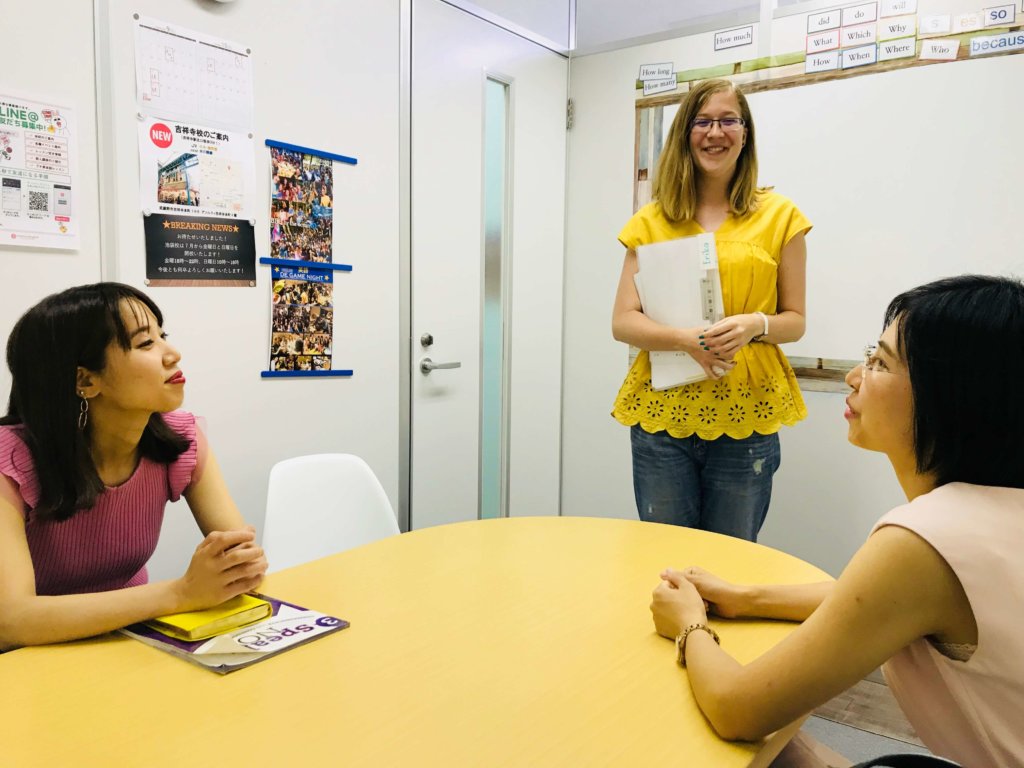English Teaching Jobs in Japan: A Complete Guide

You've come to the right place to find English teaching jobs in Japan for foreigners! We've put together this as a guide to help people who are either new to teaching or already have the experience but also thinking of some other English teaching job alternatives!
Firstly, this article serves to help you become part of the many who already have teaching jobs as foreigners in Japan. Secondly, it welcomes any person new to Japan, unsure of where to start or where to search to find a job. Thirdly, it's to help prove to you that finding a job in Japan doesn't have to be such a challenge.
Being in Japan you will often hear people upset that they haven't been able to find a job in the field they want. This is mainly because finding a job in Japan will require you to have a JLPT of at least N3 (the Japanese language proficiency test). For those of you who don't know, N3 is roughly the grade where you can start comfortably conversing and reading Kanji so if you try to find a job in Japan - most of the time you will need at least a Japanese-level of JLPT N3.
However, if you try to find a job in Tokyo, you will have more luck since the opportunity in this big city is endless!
Tokyo, city of opportunities
Tokyo is the capital, so the chances of striking gold are much higher. However, you will find the competition for positions quite fierce. You’ll find the competition levels exponentially higher without the N2 or in some cases N1. Luckily, a teaching job is one of the gateways into Japan that doesn't require a high level of Japanese.
With this complete guide, we will try to show you some of the teaching jobs available and that finding a job as a foreigner is not hard at all!
The article will break down the teaching industry, its positives, its negatives, and of course… its salary range! All to make it easier for you when it comes to applying for teaching jobs. Please use it as a rough estimate as qualifications, company, and prefecture do affect the experience you have!

Teaching English in Japan? Of course!
When most foreigners think about jobs in Japan, they’ll think about teaching. Quite rightly so, many foreigners in Japan and especially in Tokyo spend their time teaching. Whether you’re native or non-native, you can find part-time jobs, full-time jobs, or even spend your time freelancing!
What are the options of English Teaching Jobs in Japan?
Teaching Children
Although English is now a compulsory subject from the third grade all the way to high school, a lot of parents here don't think that it is enough as Tokyo is getting more and more globalized which makes it more competitive to survive in the future. This is a sweet spot where you come in because the demand is always there! Take, for example, the SYR Bros, well-known Japanese siblings with exceptional English proficiency from a young age. Their influence has motivated Japanese parents to prioritize international exposure for their children!
As foreigners searching for teaching jobs, Teaching English to children is definitely almost always on the option list. Especially in Tokyo, it is probably one of the most lucrative ways to make a living here. The demand is almost always there, especially with parents pushing their children more and more to learn it from an early age.
There are definitely drawbacks to the high pay that this type of teaching job offers. The drawback is that it is usually very draining (especially for people who don’t like small children)! The ages will vary but most of the time it will be anywhere between 3-year-olds - 15-year-olds, sometimes in the same class!
What do you do? This section of the industry is so wide so it does vary. Most of the time you are babysitting in English if it is children under 7. If you are teaching children above 7, there are definitely still some elements of babysitting but it does involve learning! Singing, dancing, and activities such as arts & crafts are definitely something you will do at some point!
Be sure to confirm your responsibilities before you start working!
Extra Insights
Pay estimate: 1800-3000 yen per hour
Interview tip: Show your energy! I can’t stress this enough, you’ll need energy to work with children, if you can’t show this in the interview - you may be passing up a job offer!
English Cafe

English cafes provide a unique and casual environment for Japanese learners to enhance their conversational English skills. These cafes serve as informal hubs where visitors can practice English with native speakers in a relaxed and sociable atmosphere. Whether standalone establishments or part of larger language schools, English cafes aim to create an inviting space for language exchange.
As a teacher in an English cafe, your role involves facilitating engaging conversations, offering language assistance, and fostering an environment conducive to learning. The emphasis is on informal interaction, making it an ideal setting for learners to practice spoken English without the structure of a traditional classroom. Teachers may use various materials, such as discussion prompts or themed activities, to encourage dialogue and cultural exchange.
For those interested in working at English cafes in Japan, several well-known establishments are renowned for their positive atmosphere and effective language practice environments. Examples include:
Working in an English cafe not only allows teachers to contribute to language learning but also offers a chance to immerse themselves in Japanese culture through interactions with patrons. The informal and social nature of these settings provides a valuable supplement to formal language education, making English cafes a dynamic and enjoyable option for language instructors in Japan.
JET Programme
The Japan Exchange and Teaching (JET) Program is a prestigious government initiative that invites foreign English speakers to contribute to education and cultural exchange in Japan. While many participants serve as Assistant Language Teachers (ALTs) in schools, a unique opportunity within the program is the role of JET Program Coordinator. In this position, individuals play a pivotal role in fostering cultural exchange, enhancing language education, and internationalizing local communities.
As a JET Program Coordinator, your responsibilities extend beyond the classroom. You become a cultural ambassador, promoting understanding and collaboration between Japan and your home country. Coordinators often work in local government offices, planning and executing events, workshops, and initiatives that facilitate cultural exchange. This role requires a high level of cultural sensitivity, adaptability, and a genuine passion for fostering connections between diverse communities.
Specialized Language School Teacher


Specialized language schools in Japan offer a targeted approach to English language education, focusing on specific areas of expertise and tailored learning experiences. Teachers in these institutions play a crucial role in providing specialized instruction that goes beyond general language proficiency. The emphasis is on preparing students for particular purposes, exams, or professional fields.
Test Preparation Centers
Berkeley House Language Center
Known for its comprehensive test preparation courses, Berkeley House Language Center assists students in achieving success in exams such as TOEFL and TOEIC. Teachers here are expected to be well-versed in the exam formats and strategies and to help students maximize their performance.
How to apply: https://berkeleyhouse.co.jp/welcome/applynow/
Working in specialized language schools allows English teachers to leverage their expertise in specific areas, providing students with valuable skills tailored to their goals. Whether guiding students through test preparation or offering targeted instruction in professional fields, teachers in specialized language schools contribute to the diverse landscape of English language education in Japan.
Freelance Online Tutoring

Freelance tutoring and private lessons offer English teachers in Japan a flexible and personalized approach to language instruction. This option allows educators to work independently, providing one-on-one or small group lessons to individuals of varying ages and language proficiency levels. The autonomy that comes with freelancing enables teachers to create customized learning experiences, catering to the specific needs and goals of their students.
Online Platforms for Freelance Tutoring:
- italki: italki is a popular online platform connecting language learners with freelance tutors. English teachers in Japan can leverage this platform to offer lessons to students worldwide. The virtual setting provides flexibility in scheduling and allows teachers to work with learners from diverse cultural backgrounds. Apply here
- HelloSensei: HelloSensei is a platform that connects private English tutors with students in Japan. Teachers can create profiles showcasing their expertise and availability, making it a convenient option for those seeking local opportunities for freelance tutoring. Apply here
- Preply: Preply is a global platform connecting students with private tutors in various subjects, including English. Teachers on Preply set their own rates and schedules, offering flexibility for freelancers to reach a diverse international audience. Apply here
ALT - Assistant Language Teacher

This is definitely number one when it comes to acquiring a visa and working with a stable income. As it is usually a full-time position, there is no chance of part-time work as an ALT. (You are still allowed to work another part-time job as an ALT if you ask your employer and get permission from immigration).
If you have a University degree, even if it is unrelated to teaching, you are eligible. While it is definitely an advantage to be from a native-speaking country, not being from one of those countries isn’t a nail in the coffin. Some of the ALT teachers who work with us are from the Philippines, Jamaica, and all over Europe! (you can read some of our teachers' stories here).
What do you do? While it does vary depending on the school and company - most of the time when you work as an ALT, you are not in charge of the class. It is more of a team effort, you are teamed up with a licensed Japanese teacher. The tasks could include preparing for the lesson and repeating or reading words. Bear in mind, you will be in front of the class almost all the time, be prepared for that!
Be sure to confirm that the school or company that you meet with does meet your standards as an employer. Reading reviews online from Glassdoor or finding teaching forums will go a long way.
Be careful! You will receive an instructor’s visa. This visa explicitly allows you to work in Japanese public and private schools. No other work visa will allow you to do this, you will have to change your visa to work as an ALT
One of the good things about working as an ALT is the workload is not overwhelming.
It may be at first but most report having free time during the day! If your sleep cycle can tolerate the early mornings, you can also save money with the school lunch. While you may not have gone to school in Japan as an adolescent, you can definitely still enjoy the filling meals at a cheap 200-300yen
One of the downsides is that you are likely to get sick and tired more often. Not due to workload, but due to the energy spent eating lunch with children, playing with them during break times, and maybe even catching colds from them! Managing your mental health, physical health, and energy is very important for this role!
University Lecturer

In terms of career as well as salary potential, this one ranks very high. Teaching at a university is a stressful position however it is one of the most rewarding too. With the virus still looming around, most of the universities are sticking with online teaching. This means you might have a tougher time finding a job in this sector compared to other ones on this list.
The type of work varies between full-time and part-time contracts. The universities have somewhere between 3-10 teachers who are foreign (non-natives are totally okay) and this is usually a selling point for the institution.
What do you do? Teaching English at a Japanese university is likely to involve teaching English or vocabulary to undergraduate students. The classes are usually filled with students, averaging roughly 20 per lesson. Some of the more specialized lessons such as for specific courses or for business will have a lower count of students with much more dedication compared to the standardized classes.
Many of you reading might have had an experience as a learner, maybe even at university. You might have been the one or have seen students who were not motivated to learn. Mainly filling the space because parents have forced them to go or because they are required to learn English. Japan is no exception, you will definitely have some students at a point who aren’t motivated. The silver lining is that those who are dedicated are a pleasure to teach, they will ask engaging questions and will make you challenge your own learning - you will feel like you’re also learning!
Salary ranges anywhere between 300,000 - 600,000 yen per month for full-time.
The requirements for these jobs vary however what remains constant is a Master's degree, usually in teaching language as a second language. Some universities allow ANY master's degree if accompanied by experience.
Some universities in Japan which offer master's in TESOL are
These courses are offered in English.
Interview tip: most of the positions are filled by mutual connections, the first position will be hard to find. Once you’ve got your first position, you may find it easier - especially if you make great connections.
While not always the best place to search for a job, here are some places where you can find some!
JACET - Japan Association of College Teachers job postings
JALT - Japan Association of Language Teachers job postings
JRECIN - Japan Research Career Information Network
Or directly at the university
For example Temple University job opportunities
Eikaiwa (英会話 Conversational Schools)

Now, if we’re talking about teaching jobs or teaching English in Tokyo or Japan we need to talk about Eikaiwas. A large chunk of English teachers in Tokyo are working in Eikaiwas. An Eikaiwa is a private English conversational-based school. Rather than focusing on the grammatical and technical aspects of the language, they focus on speech and speaking.
Many who have taught at Eikaiwas, have worked part-time or semi-full-time. The hours are usually much more flexible, and shorter than anything else on this list. The experience may vary depending on what company you work for but the general consensus is that it’s a fun experience that everyone should do once.
Some work at an Eikaiwa alongside an ALT job. However, many of those working at Eikaiwas are people on Dependents, Working holidays, and students. Usually, the schedules line up quite well with those visas. Many of the schools open at 11 AM and close at 11 PM.
You’ll find a range of students, depending on where you work. Some places specialize in children, while some focus on business English, and a majority will just focus on all types of English. Some Eikaiwas
Business type Eikaiwas - Teaching English at a business Eikaiwa will usually involve wearing suits, slacks, or a skirt and blouse. These places will charge a premium and will involve contracts with other companies so looking the part plays a big role in the interaction. If you aren’t a suited person or prefer more freedom in your lessons/expression steer clear.
One major thing to mention about this particular teaching is that most of the time, they are learning using their company’s money or government money. They may not be interested in learning which could make a minority of the students you teach unpleasant. However, the majority are very pleasant and want to have engaging and challenging conversations!
Children and Adult Eikaiwa - These places work very similarly to the places mentioned earlier as well as the previously mentioned kids' schools. Some will find the balance refreshing as it is a very big range of students you’ll be teaching. Some will find it exhausting and the switch between the groups mentally taxing. If you aren’t a person who enjoys the company of the kids, stick to adults on Eikaiwa
Adults-only Eikaiwa - If you teach English to adults, you learn a lot about Tokyo, Japan, and culture. Although you need a lot of prep for these schools, you won’t go home exhausted from singing and dancing all day! Most of the students who are studying at these schools are paying their own money, so they truly want to be there and want to study English. Some of their ambitions range from wanting to communicate with foreigners at their store to wanting to study abroad in the future! You will almost always love your students, except for the few oddballs here and there.

That’s all for this guide! If you want to read experiences about teaching in Japan. You can read some here!

English Teaching Part-Time Job
No Experience? No Problem
We provide training, observations, and feedback for new teachers. We will help you to become an effective teacher!







